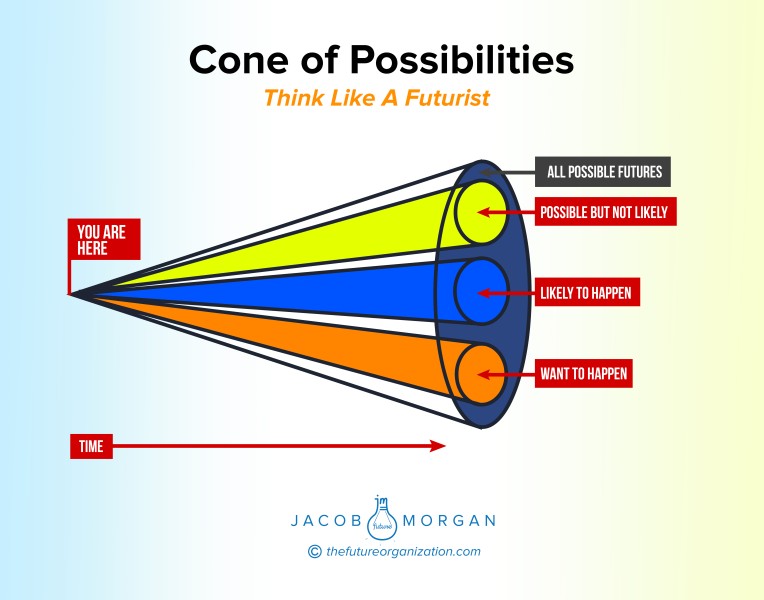What’s the top skill leaders need to succeed over the next decade and beyond? According to my interviews with more than 140 top CEOs, far and away the most needed skill is being able to think like a futurist.
Contrary to what some people believe, futurists don’t predict the future. Instead, they help make sure individuals and organizations aren’t surprised by what the future might bring. Thinking like a futurist involves looking at different possibilities and scenarios as opposed to picking one path and sticking to it.
Why Thinking Like a Futurist Matters
Most leaders use the old way of thinking where they find one possible scenario for the future and plan everything around it. But as the world starts changing even faster and the number of possibilities grows wildly, leaders and organizations need to be able to adapt and prepare for numerous possible scenarios and outcomes. That’s where thinking like a futurist comes in.
Being able to think like a futurist is a crucial skill because companies that aren’t prepared for the future will have a much harder time adapting and will likely get disrupted. Change comes fast, and we must keep an eye towards the future and be prepared for whatever will happen.

I interviewed Alfredo Perez, CEO of Alicorp in Peru, and he said this: “The fact is that adapting to change is not enough; we need to lead change and create the future. Adapting is keeping your head above water, but leading and creating is sailing on top of it.”
Companies that are led by futurists will be able to sail on top of the water and create change instead of struggling to evolve as the changes come quickly. With things changing so rapidly, leaders must be able to respond to and ideally anticipate change and have plans in place to address them.
How to Think Like a Futurist
One common method for thinking like a futurist is to look through the cone of possibilities. As you peer from one end of the cone, things that could happen within the next days or months are fairly clear. However, the cone gets wider with more possibilities when things are further away and not as clear. Things towards the center of the cone are more likely, as opposed to things on the edges that become less and less likely. Thinking through the cone of possibilities opens your eyes to potential scenarios according to how likely they are to occur.
To think like a futurist, you must look beyond what could happen in the next weeks or months. You have to be open to the entire cone of possibilities. The point is to think in terms of possibilities and scenarios and be open to numerous situations.
Many of us practice this way of thinking in our personal lives as we make big decisions like getting married or buying a house. We think through different scenarios for these long-term decisions to ensure we’re making a good choice, like considering our long-term compatibility with a partner or how the value will increase on a home. We need to extend the same way of thinking to our long-term business decisions.
I recommend asking yourself four questions when thinking through potential future decisions:
- Why might “this” happen or not happen?
- What else might happen?
- What do I want to happen and how can I make it happen?
- What factors might influence why this will or won’t happen?
Become a Future-Ready Leader
Learn the 9 skills & mindsets 140 CEOs say are MOST crucial!
Get the PDF→
Asking yourself those questions for various scenarios can open your mind to new possibilities and help you decide what outcomes are the most likely. With that mindset, you can start to prepare yourself and your organization for the future.
We also need to look towards the future and keep an eye on the horizon for potential trends and changes. We can’t afford to wait until something is right in front of us to pay attention to it. Stay informed on what’s going on in the world, how technology is being developed, and what your competitors are doing. This information can help you be aware of how the world is changing and let you know what you can do to prepare.
Thinking like a futurist is a skill that takes time to develop. Putting yourself in the right mindset and being open to new possibilities can help train your mind to consider the future and be prepared for whatever comes your way.
______________________________________________________________________________________
If you enjoyed the article and want more content like this here’s what you can do:
- Subscribe to The Future of Work Podcast where I interview business leaders around the world each week.
- Grab a copy of The Future Leader which has been endorsed by the CEOs of MasterCard, Best Buy, Oracle, Audi, Unilever, Domino’s Pizza, Ritz Carlton, Kaiser, and Marshall Goldsmith. It explores the most essential skills and mindsets for future leaders.
- If you are or want to be an entrepreneur then my wife and I just launched a brand new podcast on how to Be Your Own Boss, called the BYOB Podcast where we share what we did and how we did it. You can subscribe to that here.
